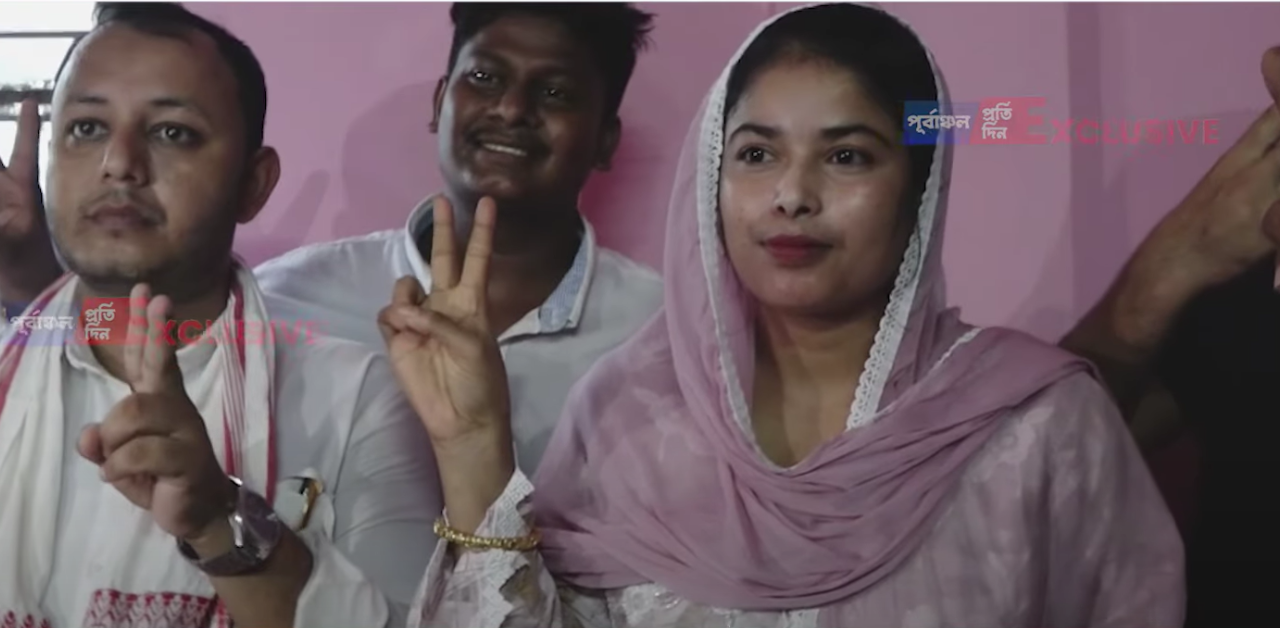Congress Returns to Power in Hailakandi Zila Parishad After 15 Years – A Historic Political Shift

After a prolonged absence from district-level governance, the Indian National Congress (INC) has staged a dramatic comeback in the Hailakandi Zila Parishad elections 2025, marking its first board formation in fifteen years. This landmark political achievement follows a high-voltage electoral battle against the Bharatiya Janata Party (BJP), regional parties, and influential independent candidates. The Hailakandi District Council election results have become the focal point of [PURVANCHAL PRATIDIN]
Assam politics, showcasing intricate alliance strategies, unexpected cross-voting, and decisive leadership moves. Historically, the Hailakandi Zila Parishad has been a challenging arena for Congress, with the BJP making deep inroads over the last decade. However, the 2025 election cycle saw Congress adopt a grassroots mobilization approach, reviving its village-level committees, strengthening booth-level presence, and winning over key independent members. The final seat tally initially locked Congress and BJP at a 3–3 deadlock, with two independents holding the balance of power. By securing the backing of independent
Fatema Begum and another neutral member, Congress appeared poised for outright control. Yet, the secret ballot process produced a dramatic twist — the results ended in a 4–4 tie, revealing a layer of cross-voting that sparked speculation across the political spectrum. For political analysts, this outcome is more than just a victory; it’s a symbolic return of the Congress brand in Barak Valley politics. Party leaders credit their revival to district-level unity, citing the combined efforts of grassroots workers, senior strategists, and
District Congress Committee President Isaf Ali. The formation of the board under Congress leadership is expected to reset the political dynamics in Hailakandi, impacting both 2026 Assam Legislative Assembly elections and broader regional alignments. This victory also underscores the growing importance of local governance bodies in shaping voter sentiment. For residents, the change brings hope for renewed development focus, infrastructure upgrades, and improved public services.
With Congress back in control, the district is now at a political crossroads, ready to turn electoral momentum into tangible governance outcomes. This historic win not only signals a potential shift in Barak Valley’s political balance but also serves as a morale booster for Congress cadres across Assam, reinforcing the idea that grassroots politics, coalition-building, and public trust remain powerful forces in Indian democracy
The Dramatic Toss That Crowned Fatema Begum as Hailakandi Zila Parishad Chairman
In a political climax that could rival any electoral drama in Assam’s recent history, the Hailakandi Zila Parishad chairman’s seat was decided not by policy debates or voter counts alone, but by the flip of a coin. The 2025 district council elections reached an unprecedented deadlock when the ruling contenders,
Indian National Congress (INC) and the Bharatiya Janata Party (BJP), ended the secret ballot session with an equal number of votes — 4 each. This tie emerged despite Congress having seemingly secured majority control through strategic alliances with independents, most notably
Fatema Begum, an influential independent candidate and wife of senior political figure Manna Khan. What began as a calculated political maneuver quickly spiraled into suspense when cross-voting disrupted expected numbers, exposing fractures and hidden negotiations within the independent camp. The Election Authority, in line with procedural rules, resolved the stalemate through a coin toss, a rare but legally recognized method in such electoral deadlocks. Witnessed by party agents, district officials, and members of the public, the toss instantly became the center of
Hailakandi’s political conversation. Fate favored Congress that day — Fatema Begum called “heads” and won, officially becoming the Chairman of Hailakandi Zila Parishad. For the BJP’s candidate Pompa Das, the moment was a bitter blow, as her party had hoped to reclaim influence in the Barak Valley district after years of grassroots expansion.
The symbolism of this toss victory is far deeper than the act itself. For Congress, it represented not only the culmination of a 15-year wait to control the district council but also a testament to the unpredictable nature of coalition politics in rural
Assam. Fatema Begum’s ascension to the chairmanship is significant on multiple fronts — she is not a traditional party-line politician, yet her alignment with Congress demonstrates the party’s adaptability in integrating influential local figures into their governance structure. Her victory speech reflected humility and a development-focused agenda, thanking the Congress party, the district members who supported her, and, in her words, “the blessings of the Almighty” for the outcome. Political observers have noted that her win might inspire a wave of women leaders to step into higher roles in Assam’s local governance. The BJP, meanwhile, is analyzing the cross-voting patterns that denied them the seat, vowing to reinforce internal discipline and strengthen their appeal among independents in future contests.
As news of the toss win spread, celebrations erupted at the Hailakandi District Congress office, with party workers and supporters chanting slogans, bursting crackers, and rallying in the streets.
Social media platforms lit up with congratulatory posts, memes about the dramatic coin toss, and political commentary dissecting every detail of the event. For the people of Hailakandi, this day will be remembered not just as the day Congress reclaimed power, but as the day a coin flip decided the future leadership of their district — a rare moment where politics and chance intertwined, altering the course of local governance.
Development Promises, Public Hopes, and the Political Ripple Effect of Congress’s Hailakandi Win
With the suspense of the election and the drama of the coin toss behind them, the Hailakandi Zila Parishad’s new leadership, headed by Chairman Fatema Begum and Vice-Chairman Juhi Akthar Laskar, has shifted the spotlight toward governance and development. In her first public statements after taking the oath, Fatema Begum outlined a vision centered on infrastructure improvement, rural development, women’s empowerment, education reforms, and better access to healthcare services.
Emphasizing unity and inclusive governance, she pledged to work “for every resident of Hailakandi, regardless of political affiliation,” signaling a cooperative approach in a politically diverse district. For many citizens, this commitment resonates strongly — especially given the district’s longstanding challenges with road connectivity, clean drinking water, irrigation facilities, and employment opportunities.
The public reaction to the Congress victory has been overwhelmingly celebratory among party loyalists, while even neutral voters have expressed cautious optimism. At the District Congress Bhavan, supporters hailed the win as a “return of stability” to local governance after years of fragmented control. In villages and market areas, conversations are now less about the election drama and more about whether the new leadership can deliver on promises. Social media discussions reflect a blend of hope and scrutiny — posts celebrating the historic return of
Congress to power after 15 years are paired with reminders that expectations are high and patience may be short. For many residents, tangible progress in the first year will determine whether this political shift translates into lasting public trust.
Politically, the implications of the Hailakandi win extend beyond district boundaries. The victory has boosted Congress’s morale in the Barak Valley and could serve as a launching pad for the party’s strategy in the
2026 Assam Assembly elections. Senior Congress figures have already framed the result as evidence that grassroots organizing and alliance-building can counter the BJP’s growing influence in Assam. The success of securing an independent candidate like Fatema Begum as chairman highlights a strategic flexibility that could be replicated in other districts where direct party strength is insufficient for a standalone win. On the
BJP’s side, the outcome — particularly the cross-voting surprise — has prompted internal evaluations, with leaders vowing to tighten coordination with allied members and prevent similar setbacks.
For Hailakandi’s governance, the challenge ahead lies in moving swiftly from celebration to execution. Development projects in rural Assam often face bureaucratic delays, funding constraints, and coordination issues between state and district administrations.
Fatema Begum’s administration will need to leverage political goodwill while managing these hurdles. Priority projects expected in the coming months include upgrading rural roads, modernizing key market areas, expanding drinking water networks, and promoting self-help groups (SHGs) for women’s economic empowerment. Education and health infrastructure — particularly in underdeveloped panchayat areas — are also high on the agenda. If successfully implemented, these initiatives could not only transform
Hailakandi’s development trajectory but also solidify Congress’s standing in the region.
In short, the Hailakandi Zila Parishad win has given Congress a renewed platform to prove its governance capabilities. For the people, it has rekindled hope that political change can bring real improvement. For Assam’s political landscape, it has sent a message that even after years in the wilderness, a party with strategic alliances, grassroots engagement, and a unifying development vision can stage a remarkable comeback.
Abdus Saboor Tapdar Condemns BJP MLA's Controversial Remarks
In a strong rebuttal to BJP MLA Vijay Malakar’s recent statement, Advocate Abdus Saboor Tapdar has raised serious objections, calling the remarks “unwarranted and divisive.” Tapdar emphasized the importance of responsible political discourse, especially in sensitive regions like Assam, where communal harmony is paramount. He urged political leaders to refrain from making statements that could incite unrest and instead focus on fostering unity and development. For more details on Tapdar’s response and the implications of Malakar’s comments, refer to our comprehensive coverage here: Abdus Saboor Tapdar strongly objects to BJP MLA.
Momtaz Begum Appointed In-Charge President of Karimganj Mahila Congress
On July 19, 2025, the Assam Pradesh Mahila Congress Committee appointed Momtaz Begum as the In-Charge President of the Karimganj District Mahila Congress. This strategic appointment reflects the party’s commitment to strengthening its organizational structure and promoting women’s empowerment in the region. Momtaz Begum, a seasoned political leader and legal professional, has been actively involved in various social and political initiatives, earning respect among party workers and supporters. Her new role is expected to invigorate the party’s presence in Karimganj, motivating grassroots activists to enhance women’s participation in politics. For a detailed report on her appointment and political background, please read: Momtaz Begum Appointed In-Charge President of Karimganj Mahila Congress.



